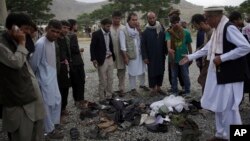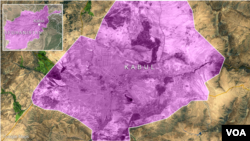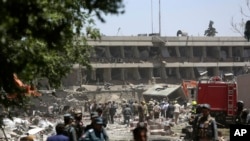A suicide bombing at a funeral service in Kabul, Afghanistan, has killed at least six people and wounded nearly 90 others, but officials said high-ranking government officials and lawmakers attending the event escaped unhurt.
The country’s TOLOnews TV, however, quoted its sources at the Afghan Public Health Ministry as saying Saturday’s blasts killed up to 20 people.
The bombs went off at a city cemetery where the son of a senior member of the Afghan parliament was about to be buried.
The deceased, Salim Ezadyar, was one of several anti-government protesters killed during Friday’s clashes with security forces in downtown Kabul.
Afghan Chief Executive Abdullah Abdullah, who was present at the funeral service along with several cabinet members, including the foreign minister, later told a nationally televised news conference three bombers detonated their vests while mourners were offering their prayers.
He called for an investigation into how the attackers managed to enter the funeral service where high-ranking government officials were present.
Taliban denies involvement
The Taliban swiftly released a statement saying it had nothing to do with the attack and claimed internal government rivalries were to be blamed.
Friday’s protest rally was staged to demand President Ashraf Ghani and Abdullah step down for failing to provide security and prevent a massive truck bombing in the capital on Wednesday.
That blast, in a highly-secure diplomatic sector of Kabul, left at least 90 people dead and 450 wounded, including foreign diplomats.
The protesters, including victim families, tried to march on the presidential palace to press for their demands when Afghan forces opened fire to disperse the crowd.
Speaking Saturday, Abdullah dismissed resignation demands, saying that would not help resolve the security and terrorism challenges facing the country.
“At these times, they [victims’ families] have their concerns, they have their views and they have their demands. If that would have been the solution for the challenges that the country is faced with, I am sure I can at least talk for myself that I would have been ready to resign,” Abdullah said.
He went on to reiterate that a number of terrorist groups are active inside Afghanistan and the government is aware of those supporting the groups. He did not elaborate, but Afghan leaders blame neighboring Pakistan for sheltering Taliban insurgents.
Wednesday bombing
Kabul also has blamed the Pakistani intelligence agency for helping the Haqqani terrorist network plot Wednesday’s attack in the city, one of the deadliest strikes in years.
Pakistan’s foreign policy advisor, Sartaj Aziz, again rejected those allegations on Saturday.
“I think that instead of blaming Pakistan for the Kabul attack of May 31, we would urge the Afghan authorities to share whatever evidence they have on the tragic incident so that Pakistan can take the required action,” Aziz told VOA.
He also dismissed allegations that the Haqqani network is using Pakistani soil for staging cross-border attacks.
Aziz insisted that recent military-led counterterrorism operations have “broken the back of terrorist networks, including the Haqqani network” in the traditionally volatile tribal areas near the Afghan border.






